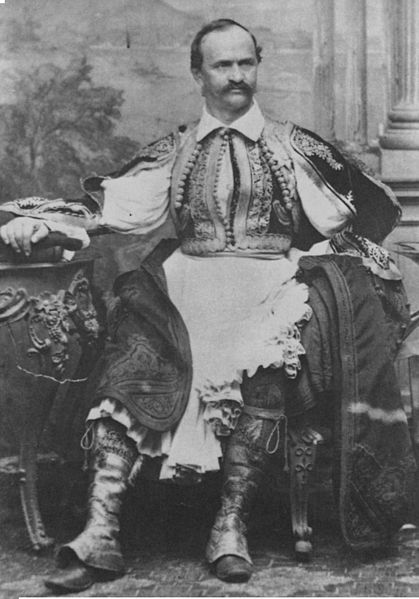by Scott Mehl © Unofficial Royalty 2013

King Otto of Greece, 1867. Photo: Wikipedia
Prince Otto of Bavaria was born at Mirabell Palace in Salzburg, Austria on June 1, 1815, the second son of King Ludwig I of Bavaria and Therese of Saxe-Hildburghausen.
Otto had eight siblings:
- King Maximilian II of Bavaria (1811 – 1864) – married Princess Marie of Prussia, had issue
- Princess Mathilde Karoline of Bavaria (1813 – 1862) – married Ludwig III, Grand Duke of Hesse and by Rhine, no issue
- Princess Theodelinde (1816 – 1817) – died in infancy
- Luitpold, Prince Regent of Bavaria (1821 – 1912) – married Archduchess Auguste of Austria-Tuscany, had issue
- Princess Adelgunde (1823 -1914) – married Francesco V, Duke of Modena, had issue
- Princess Hildegard of Bavaria (1825 – 1864) – married Archduke Albert of Austria, had issue
- Princess Alexandra of Bavaria (1826 – 1875) – unmarried
- Prince Adalbert of Bavaria (1828 – 1875) – married Infanta Amelia Philippina of Spain, had issue
In 1832, the Convention of London established Greece as a kingdom, and the Great Powers appointed Otto the new kingdom’s first king. He was their second choice. The throne was initially offered to Prince Leopold of Saxe-Coburg and Gotha, who declined, choosing instead to become the first King of the Belgians. Only 17 at the time, Otto arrived in his new country on a British warship, accompanied by 3,500 Bavarian troops and his advisors, who would form a Regency Council to rule Greece until Otto’s majority. He quickly made steps to endear himself to the Greek people, even taking on the Greek version of his name Othon.
Otto stood no chance of truly being accepted by the Greek people. Although he deemed that his heirs would be raised in the Greek Orthodox faith, Otto refused to convert from Roman Catholicism. Tasked with making Greece a viable and flourishing kingdom, heavy taxes were imposed to get the necessary funds. Neither of these situations went over well with the population.
The Greek people initially accepted Otto’s 1836 marriage to Amalia of Oldenburg. However, she quickly became involved in Greek politics and her refusal to give up her Protestant faith and the couple’s lack of an heir led to her becoming greatly disliked by the people.
Having dismissed the Regency Council in 1835, Otto ruled as an absolute monarch for a few years until there were uprisings from the Greek people, demanding a constitution. His original Bavarian troops having left Greece, Otto had no recourse but to give in to the demands and allow for a constitution and convention of a Greek National Assembly.
Throughout his reign, King Otto had the full support and backing of the Great Powers. This would begin to change in 1850. The Athens home of a British subject was vandalized and the authorities watched and did nothing to stop it. This became known as the Pacifico Affair. The British quickly responded, demanding retribution and compensation for the victim. The British Royal Navy was sent in to block off Piraeus, the primary port in Athens. This led to tension between the Great Powers, but the British held firm for several months until the Greek government finally agreed to settle the affair. Several years later, King Otto’s intent to join Russia in her battle against Turkey in the Crimean War was another significant event in Otto’s reign. Again, the British blocked off the port of Piraeus, forcing Greece to reconsider and remain neutral.
While away from Athens in 1862, a coup led to the formation of a provisional government, and Otto was deposed. Under the advice of the Great Powers, Otto accepted the situation, and he again boarded a British warship and returned to Bavaria. He would continue to wear his Greek uniforms and secretly gave most of his fortune to support the Greek troops in the Cretan Rebellion of 1866. He spent his exile living at the New Palace in Bamberg, Kingdom of Bavaria, now in the German state of Bavaria, where he died on July 26, 1867. Otto was buried in the Wittelsbach Royal Crypt at the Theatinerkirche in Munich, Kingdom of Bavaria, now in the German state of Bavaria. At his specific request, he was buried in his Greek uniform.

Tomb of King Otto; Photo Credit Susan Flantzer
This article is the intellectual property of Unofficial Royalty and is NOT TO BE COPIED, EDITED, OR POSTED IN ANY FORM ON ANOTHER WEBSITE under any circumstances. It is permissible to use a link that directs to Unofficial Royalty.
Greece Resources at Unofficial Royalty
